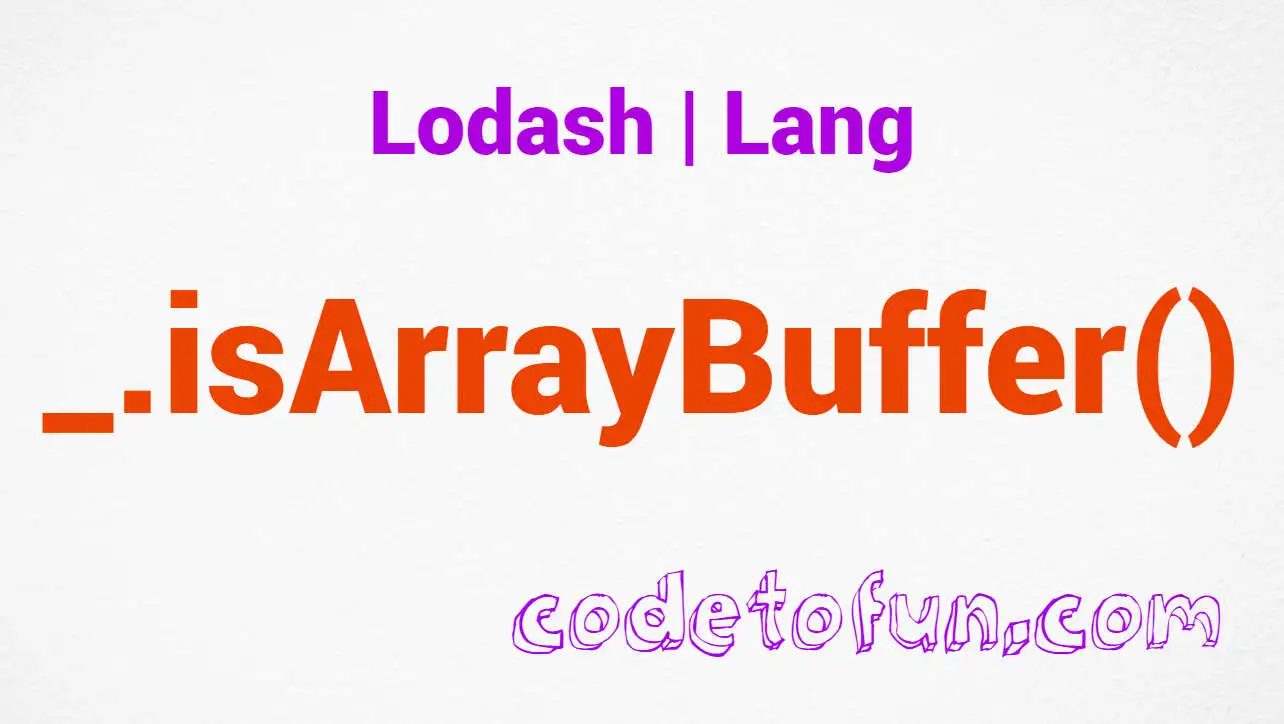
Lodash Home
- Lodash Intro
- Lodash Array
- Lodash Collection
- Lodash Date
- Lodash Function
- Lodash Lang
- _.castArray
- _.clone
- _.cloneDeep
- _.cloneDeepWith
- _.cloneWith
- _.conformsTo
- _.eq
- _.gt
- _.gte
- _.isArguments
- _.isArray
- _.isArrayBuffer
- _.isArrayLike
- _.isArrayLikeObject
- _.isBoolean
- _.isBuffer
- _.isDate
- _.isElement
- _.isEmpty
- _.isEqual
- _.isEqualWith
- _.isError
- _.isFinite
- _.isFunction
- _.isInteger
- _.isLength
- _.isMap
- _.isMatch
- _.isMatchWith
- _.isNaN
- _.isNative
- _.isNil
- _.isNull
- _.isNumber
- _.isObject
- _.isObjectLike
- _.isPlainObject
- _.isRegExp
- _.isSafeInteger
- _.isSet
- _.isString
- _.isSymbol
- _.isTypedArray
- _.isUndefined
- _.isWeakMap
- _.isWeakSet
- _.lt
- _.lte
- _.toArray
- _.toFinite
- _.toInteger
- _.toLength
- _.toNumber
- _.toPlainObject
- _.toSafeInteger
- _.toString
- Lodash Math
- Lodash Number
- Lodash Object
- Lodash Seq
- Lodash String
- Lodash Util
- Lodash Properties
- Lodash Methods
Lodash _.isArrayBuffer() Lang Method

Photo Credit to CodeToFun
🙋 Introduction
In the vast landscape of JavaScript, data type checking is a fundamental aspect of robust programming. Lodash, a comprehensive utility library, provides the _.isArrayBuffer() method as part of its suite of tools for efficient type checking.
This method specifically addresses the need to determine whether a given value is an ArrayBuffer, offering a reliable solution for developers working with binary data or low-level operations.
🧠 Understanding _.isArrayBuffer() Method
The _.isArrayBuffer() method in Lodash serves as a reliable means to check whether a value is an ArrayBuffer. This is particularly useful in scenarios where binary data manipulation or interfacing with low-level APIs is prevalent.
💡 Syntax
The syntax for the _.isArrayBuffer() method is straightforward:
_.isArrayBuffer(value)- value: The value to check.
📝 Example
Let's dive into a simple example to illustrate the usage of the _.isArrayBuffer() method:
const _ = require('lodash');
const buffer = new ArrayBuffer(8);
const isArrayBuffer = _.isArrayBuffer(buffer);
console.log(isArrayBuffer);
// Output: trueIn this example, the isArrayBuffer variable is assigned true because buffer is indeed an ArrayBuffer.
🏆 Best Practices
When working with the _.isArrayBuffer() method, consider the following best practices:
Validating Binary Data:
When working with binary data, use
_.isArrayBuffer()to validate whether a given value is an ArrayBuffer before performing operations that specifically require this data type.example.jsCopiedconst data = /* ... fetch binary data from an API or other source ... */; if (_.isArrayBuffer(data)) { // Process the ArrayBuffer console.log('Processing binary data...'); } else { console.error('Invalid data type. Expected ArrayBuffer.'); }Type-Checking Parameters:
In functions or methods that expect an ArrayBuffer as a parameter, employ
_.isArrayBuffer()for type-checking to ensure the correct data type is provided.example.jsCopiedfunction processData(inputBuffer) { if (_.isArrayBuffer(inputBuffer)) { // Continue processing the ArrayBuffer console.log('Processing data...'); } else { console.error('Invalid input. Expected ArrayBuffer.'); } } // Usage const binaryInput = /* ... generate or fetch ArrayBuffer ... */; processData(binaryInput);Handling External Inputs:
When dealing with user inputs or external data sources, use
_.isArrayBuffer()to validate whether the received data conforms to the expected ArrayBuffer type.example.jsCopiedfunction handleUserInput(userData) { if (_.isArrayBuffer(userData)) { // Proceed with processing the ArrayBuffer console.log('Handling user input...'); } else { console.error('Invalid user input. Expected ArrayBuffer.'); } } // Usage const userInputData = /* ... user-provided data ... */; handleUserInput(userInputData);
📚 Use Cases
Binary Data Processing:
In scenarios where binary data processing is a core requirement,
_.isArrayBuffer()ensures that the data provided for processing is of the correct type.example.jsCopiedconst binaryData = /* ... fetch or generate binary data ... */; if (_.isArrayBuffer(binaryData)) { // Process the binary data console.log('Processing binary data...'); } else { console.error('Invalid data type. Expected ArrayBuffer.'); }Low-Level API Interfacing:
When interfacing with low-level APIs that expect or return ArrayBuffer objects,
_.isArrayBuffer()helps validate and handle the data appropriately.example.jsCopiedfunction fetchDataFromLowLevelAPI() { const rawData = /* ... fetch data from low-level API ... */; if (_.isArrayBuffer(rawData)) { // Process the ArrayBuffer from the API console.log('Processing low-level API data...'); } else { console.error('Invalid data type from API. Expected ArrayBuffer.'); } }Buffer Management:
In applications where managing data buffers is crucial,
_.isArrayBuffer()aids in ensuring that buffers are of the correct type before manipulation.example.jsCopiedfunction manipulateDataBuffer(dataBuffer) { if (_.isArrayBuffer(dataBuffer)) { // Perform operations on the data buffer console.log('Manipulating data buffer...'); } else { console.error('Invalid data buffer type. Expected ArrayBuffer.'); } } // Usage const bufferToManipulate = /* ... fetch or create data buffer ... */; manipulateDataBuffer(bufferToManipulate);
🎉 Conclusion
The _.isArrayBuffer() method in Lodash is a valuable tool for JavaScript developers, especially when dealing with binary data or low-level operations. By incorporating this method into your code, you can ensure robust type checking and enhance the reliability of applications that involve ArrayBuffer objects.
By adhering to best practices and exploring diverse use cases, you can harness the full potential of the _.isArrayBuffer() method in your Lodash projects.
👨💻 Join our Community:
Author

For over eight years, I worked as a full-stack web developer. Now, I have chosen my profession as a full-time blogger at codetofun.com.
Buy me a coffee to make codetofun.com free for everyone.
Buy me a CoffeeShare Your Findings to All
Recent Post in lodash


Lodash _.templateSettings.imports Property

Lodash _.templateSettings.evaluate Property

Lodash _.templateSettings Property

Lodash _.templateSettings.escape Property

Lodash _.templateSettings.interpolate Property








If you have any doubts regarding this article (Lodash _.isArrayBuffer() Lang Method), please comment here. I will help you immediately.